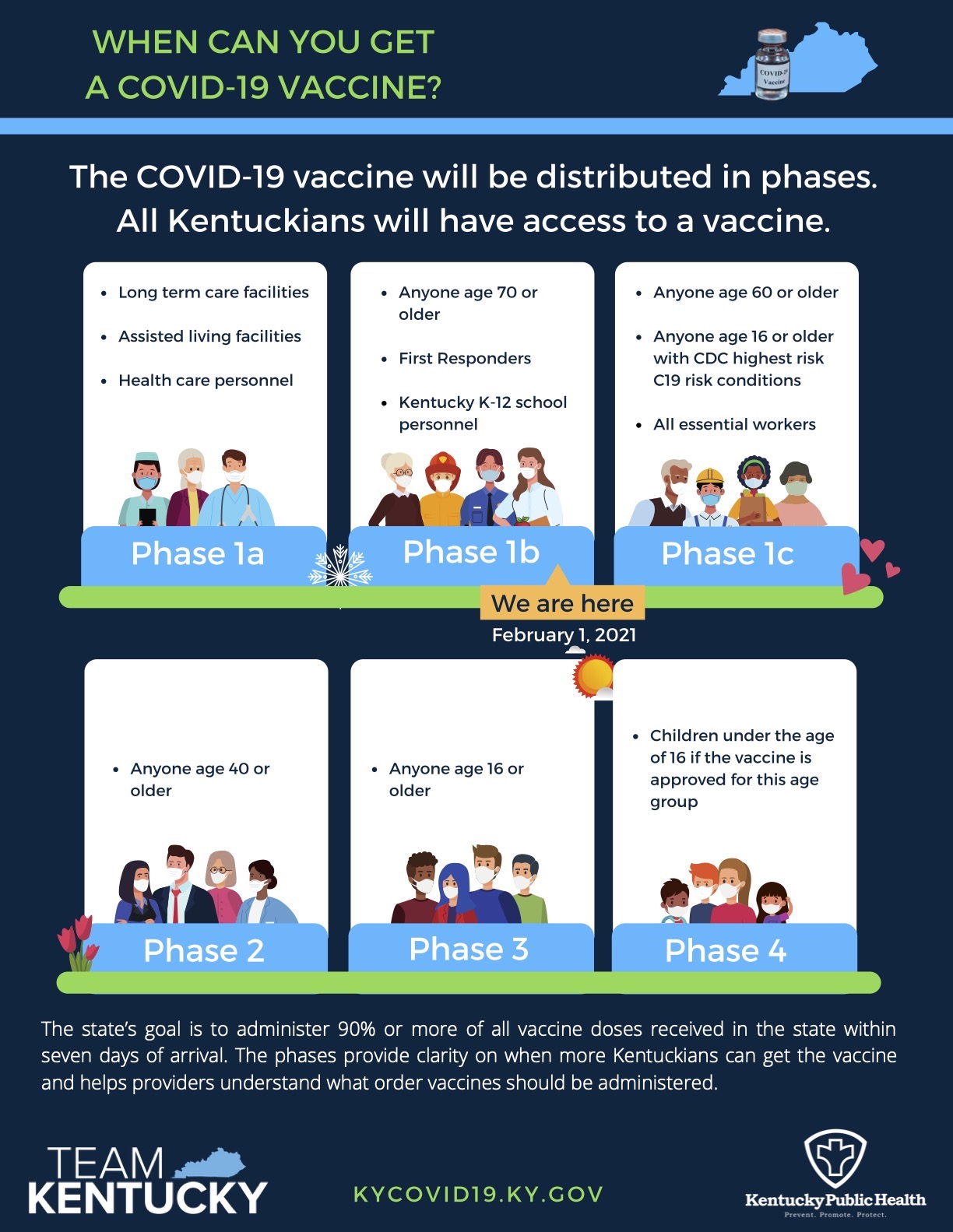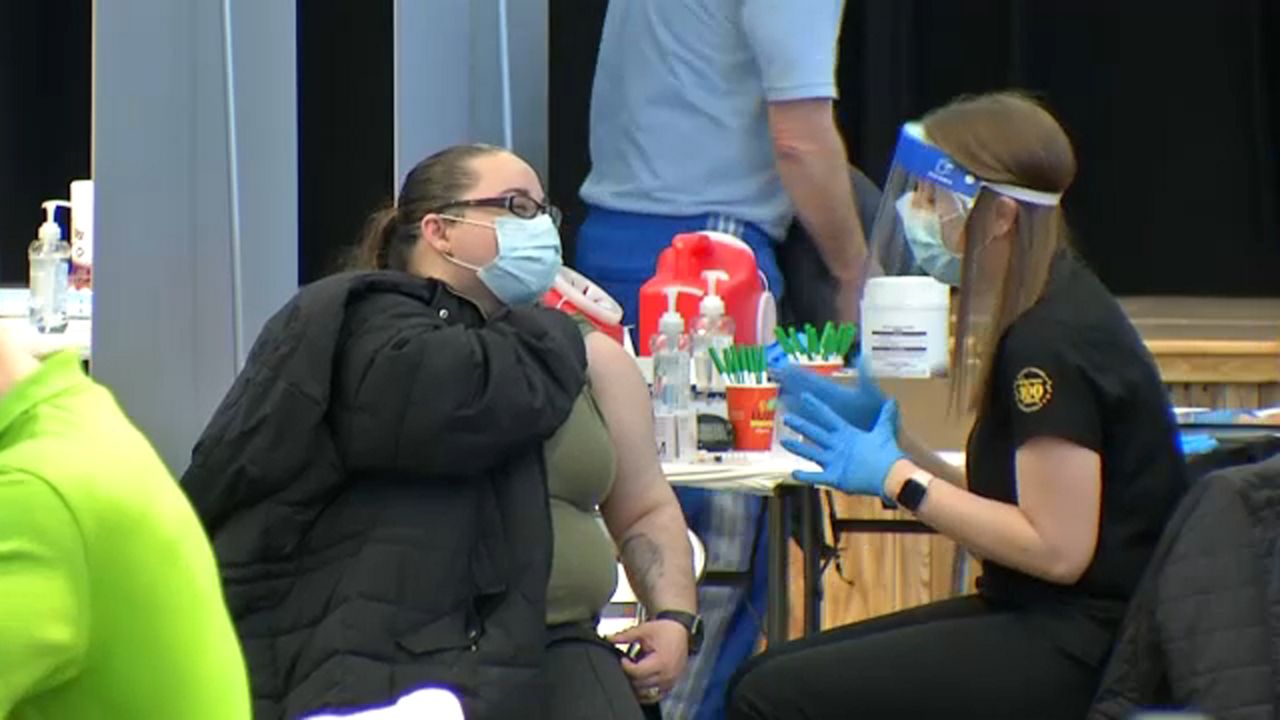LEXINGTON, Ky. – Kentucky has been administering COVID-19 vaccines for nearly three months, and more than 830,000 doses have been administered in the state. But supply has not kept up with demand, and many people who want the vaccine are not yet able to get it. Here's what you need to know about the rollout of the vaccine in the commonwealth:
What You Need To Know
- The first vaccines were administered in mid-December
- In Kentucky, those in group 1C are now eligible for vaccination
- Demand for vaccines is currently higher than supply but that is easing
- The COVID-19 vaccines are safe and effective at preventing severe COVID-19 illness
QUESTION: Where can I register to get my vaccine?
ANSWER: Start with the Kentucky COVID-19 website. Click here and choose the county where you live. If it has medical resources to deliver the vaccine, you will be able to click a register for your shot. If there’s nothing in your county, try calling Kentucky’s COVID-19 Hotline at 800-722-5725. Another option is checking with your local health department, which may be administering the vaccine.
On Feb. 2, Kentucky opened a mass vaccination site in Lexington. Three more are coming. The White House will also begin shipping vaccines to local pharmacies on Feb. 11 as a part of the Federal Retail Pharmacy Program.
QUESTION: When will it be my turn to get the vaccine?
ANSWER: Kentucky has laid out a six-tier plan to determine who can get the vaccine and when they can get it. Due to limited supply, recipients must be prioritized and Kentucky is putting “people who are more likely to have severe COVID-19 illness and workers that are essential to the functioning of society” at the top of the list, according to the Kentucky COVID-19 website.
The first group, dubbed 1A, includes front-line health care workers and people living in long-term care facilities and assisted-living facilities. The next group, which is currently eligible for vaccination, includes first responders, K-12 school personnel and anyone over the age of 69. Group 1C is anyone over 59 years old, all essential workers, and anyone over 15 years old who has a high-risk condition. Group 2 is anyone over 39, group 3 is anyone over 15, and group 4 is children, provided a vaccine is approved from them.
The state has a website and phone number (855-598-2246) to help Kentuckians determine if they're eligible for the vaccine.

QUESTION: What are the high-risk conditions that make someone eligible for group 1C?
ANSWER: Kentucky is following the recommendations of the Centers for Disease Control and Prevention (CDC) to determine who is high-risk for severe COVID-19 illness. That includes those who the following conditions:
- Cancer
- Chronic kidney disease
- COPD (chronic obstructive pulmonary disease)
- Down Syndrome
- Heart conditions, such as heart failure, coronary artery disease, or cardiomyopathies
- Immunocompromised state (weakened immune system) from solid organ transplant
- Obesity (body mass index [BMI] of 30 kg/m2 or higher but less than 40 kg/m2)
QUESTION: What will happen at my vaccine appointment?
ANSWER: In addition to getting vaccinated, you will get information on the specific drug you were given. You will also be given a card with the name of the specific vaccine you received, along with the date you received it and the location where it was administered. You will also be given a date to return to get the second dose of the vaccine, at least until a one-dose vaccine is approved.
QUESTION: What are the side effects like?
ANSWER: Some common side effects are pain and swelling at the injection site, along with fever, chills, and headache. These side effects are normal, but the CDC recommends contacting your doctor if tenderness at the vaccine site lasts more than 24 hours, and other side effects last more than a few days.
QUESTION: Will I still need to wear a mask and socially distance after getting vaccinated?
ANSWER: On March 8, 2020, the CDC changed its guidelines regarding mask wearing following the vaccine.
- You can gather indoors with fully vaccinated people without wearing a mask.
- You can gather indoors with unvaccinated people from one other household (for example, visiting with relatives who all live together) without masks, unless any of those people or anyone they live with has an increased risk for severe illness from COVID-19.
- If you’ve been around someone who has COVID-19, you do not need to stay away from others or get tested unless you have symptoms.
- However, if you live in a group setting (like a correctional or detention facility or group home) and are around someone who has COVID-19, you should still stay away from others for 14 days and get tested, even if you don’t have symptoms.
QUESTION: How many doses of the vaccine is Kentucky receiving at a time?
ANSWER: Not enough. Gov. Andy Beshear has said repeatedly that Kentucky could administer more vaccines than it is receiving. He's also frustrated with the inconsistent pace of delivery. For example, in the second week of January, he said Kentucky received 83,212 doses of the vaccine. The following week, the state received only 56,175. In late January, he announced that the federal government would increase Kentucky's weekly vaccine allotment by 16% to 17%.
QUESTION: Will there be a charge to get the vaccine?
ANSWER: No. The vaccines are being administered free of charge to patients, whether they have health insurance or not. Providers may still bill a patient's insurance company though.
QUESTION: Which companies are currently providing vaccines?
ANSWER: As of this writing, only two COVID-19 vaccines have been approved for emergency use in the U.S. There are the mRNA vaccines from Pfizer and Moderna. The two drugs will likely be joined in the coming weeks by a vaccine from Johnson & Johnson. Given the limited supply of the vaccine, it's not currently possible to choose which one you receive.
ANSWER: While some are worried about vaccine hesitant groups refusing shots, Kentucky has not had much of a problem with this, Gov. Beshear said recently. But as vaccine supply ramps up, finding the hesitant groups and convincing them to get vaccinated will be a key to achieving herd immunity. As a state with many rural citizen, this could be a problem in Kentucky. A poll in December showed that vaccine hesitancy is highest among Republicans and rural residents. Some Black Americans are also hesitant. In January, a group of Black community leaders in Louisville was vaccinated in show of faith for the vaccine.








